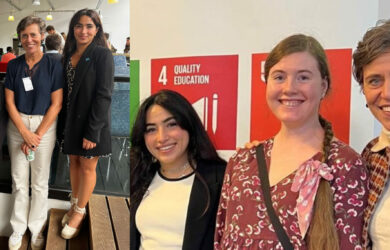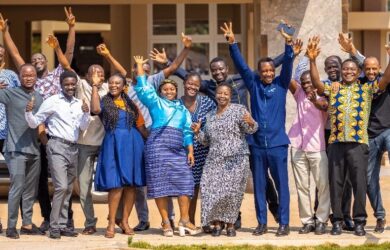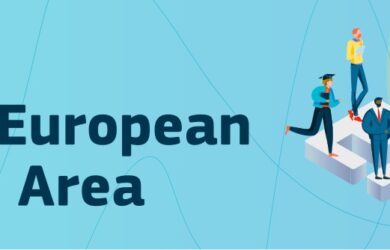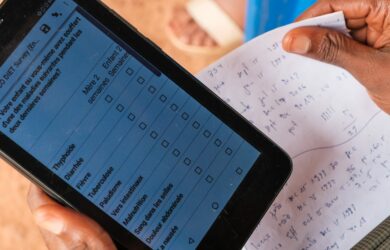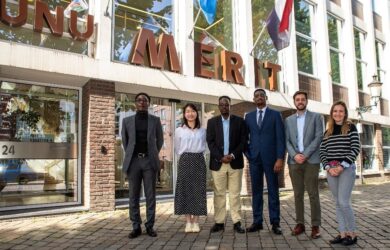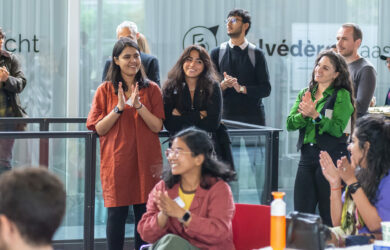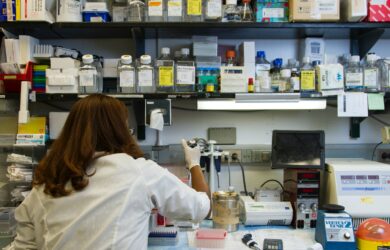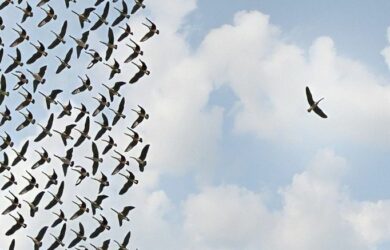- ABOUT US
- RESEARCH
- EDUCATION
- The Graduate School
- PhD Programme
- MSc Programmes
- Capacity Development
- News
- Design and Evaluation of Public Policies (DEPP)
- Design and Evaluation of Innovation Policies (DEIP)
- Evidence-Based Policy Research Methods (EPRM)
- Migration Management Diploma Programme (MMDP)
- Moving the Migration Policy Agenda Forward (MMPAF)
- Online Courses
- Short Courses (Masters)
- Tailor-made programmes
- UNU-MERIT, ITU Academy Training Centre
- Alumni
- Academic Funding
- NEWS
- EVENTS
- PUBLICATIONS
- LIBRARY
Research Week at UNU-MERIT: An inside perspective from our PhD Office
28 March 2024
Each year in March, UNU-MERIT’s PhD Office organizes a week-long event known as Research Week, offering a dedicated time for PhD fellows to focus on their research and connect with peers. But what exactly does the Research Week entail, and how does it benefit the institute as a whole? Basking in the afterglow of this year’s edition (18 – 22 March), our PhD Office team – comprised of Micheline Goedhuys, Hampton Wong, Julia Walczyk and Soha Youssef – share their thoughts on what ...
Continue Reading →How four UNU-MERIT PhD alumni redefined ‘research stay’ in Ghana
01 February 2024
By Victor Osei Kwadwo, researcher and lecturer at UNU-MERIT In March 2023, three friends and I – all of us graduates of UNU-MERIT’s PhD programme – were thrilled when we stumbled upon a research fellowship opportunity in Africa, our home continent. Unfortunately, it turned out that the call was for individual three-month research stays. Our lives (some of us being parents) and newly launched careers simply wouldn’t bend that far. But, as any good scholar knows, constraints breed creativity...
Continue Reading →New European Research Area Policy Platform includes UNU-MERIT’s research contributions
29 January 2024
Last week, the European Commission launched its European Research Area Policy Platform, aspects of which researchers from UNU-MERIT and Maastricht University worked on as part of a larger consortium. About the European Research Area Launched in 2000, the European Research Area (ERA) aims to create a single European market for research, innovation and technology that fosters the free movement of researchers, scientific knowledge and innovation. The overarching goal is to boost Europ...
Continue Reading →The art and science of questioning others
29 November 2023
New book distills three decades of learnings on survey design Despite all the digital and virtual means by which the world is connected, when it comes to a researcher in, say, Brussels trying to get to know a community in, say, Almaty on a level that’s technical, substantial and deep enough to include in research, a physical, vocal or face-to-face survey still yields the best results. (And isn’t that nice?) So posits UNU-MERIT professorial fellow Anthony Arundel, who began his research into sur...
Continue Reading →In our flagship capacity development programme, more focus on peer learning
16 October 2023
Here’s what participants have to say about our EPRM revamp Last semester, the Capacity Development Office at UNU-MERIT made changes to its flagship Evidence-Based Policy Research Methods (EPRM) programme based on feedback from its participants, who are working professionals from across the globe looking to enhance their ability to engage with research for better policymaking. While in essence the programme stays the same, some elements are now linked better to participants’ needs. So, what’s new...
Continue Reading →Inspiration, connection and collaboration: UNU-MERIT’s Internal Conference 2023
06 October 2023
On 28-29 September, UNU-MERIT held its annual Internal Conference — an intensive two-day gathering that convened all of our PhD fellows (both full-time and dual career), researchers and professors for an in-person research exchange. During this much-anticipated event, our academic community members showcased their scientific endeavours to their peers, received valuable feedback, gained new perspectives and inspiration from two esteemed external keynote speakers, and enjoyed a social evening out ...
Continue Reading →What did Horizon 2020 teach us about funding excellent science?
26 September 2023
Results from a new evaluation study In 2020, the EU’s EUR 80 billion research and innovation funding programme Horizon 2020 came to a close after running since 2014. Now, as its successor Horizon Europe kicks into gear, analyses and learnings from the original programme are being put forth to inform how this next Horizon can put its EUR 95.5 billion to best effect, and how the lessons learned can be used in Horizon Europe’s successor FP10. In this vein, the European Commission recently published...
Continue Reading →South Korea, Switzerland, Denmark: New report ranks global and European countries on innovation
06 July 2023
European Innovation Scoreboard 2023 released today The twenty-second edition of the European Innovation Scoreboard (EIS), which provides a comparative analysis of the research and innovation performance of EU Member States and selected third countries, was published today, 6 July 2023. The EIS presents and compares the relative strengths and weaknesses of countries’ research and innovation systems and helps policymakers assess areas in which they need to concentrate their efforts in ord...
Continue Reading →Novel researchers have a lower chance of winning funding
26 July 2021
In a 2012 Nature article, provocatively titled ‘Conform and be funded’, Joshua Nicholson and John Ioannidis showed that few of the most highly cited US biomedical scientists received funding from the country’s National Institutes of Heath. They attributed this to a reluctance at the agency to support potentially groundbreaking work. Since then, the sense that research funding is risk-averse and biased against novel work has become increasingly widespread within the scientific community. The poss...
Continue Reading →What a year with no travel taught us about the future of fieldwork
16 July 2021
For many researchers working on projects that spanned international borders, the imposition of travel restrictions as a result of the COVID-19 pandemic necessitated a rapid change in ways of working. Drawing on their own experience and those of colleagues of carrying out fieldwork during the pandemic, UNU-MERIT researcher Talitha Dubow and PRIO researcher Marta Bivand Erdal propose practical recommendations to support a more collaborative mode of fieldwork, which might be among the building bloc...
Continue Reading →Archives
Contact
UNU-MERIT
Boschstraat 24
6211 AX Maastricht
The Netherlands
T: +31 43 388 44 00
Email: info@merit.unu.edu
Boschstraat 24
6211 AX Maastricht
The Netherlands
T: +31 43 388 44 00
Email: info@merit.unu.edu
Partner sites
Newsletters
© 2024 UNU-MERIT | Maastricht University


